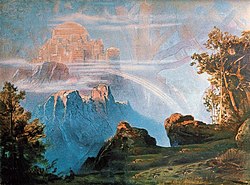
Back Walhalla Afrikaans Wælheall ANG فالهالا Arabic Valhalla Azerbaijani Walhall BAR Вальхала Byelorussian Валхала Bulgarian Valhalla Breton Valhal·la Catalan Valhalla Czech

In Norse mythology, Valhalla (/vælˈhælə/ val-HAL-ə, US also /vɑːlˈhɑːlə/ vahl-HAH-lə;[1] Old Norse: Valhǫll [ˈwɑlhɒlː], lit. 'Hall of the Slain')[2] is described as a majestic hall located in Asgard and presided over by the god Odin. There were five possible realms the soul could travel to after death. First was, Fólkvangr which was ruled by the goddess Freyja. Second, was Hel, ruled by Hel, Loki's daughter. The third realm was that of the goddess Rán. The fourth realm was the Burial Mound where the dead could live, and the last realm was Valhalla, ruled by Odin and was called the Hall of Heroes.[3] The masses of those killed in combat (known as the einherjar), along with various legendary Germanic heroes and kings, live in Valhalla until Ragnarök, when they will march out of its many doors to fight in aid of Odin against the jötnar. This eternal battle and life in Valhalla was a reflection of greater Viking ideals, for "what finer way to exist other than fighting, killing, and feasting with your erstwhile enemies, united in the common enterprise of training for the final battle”.[4] Valhalla was idealized in Viking culture and gave the Scandinavians a wide spread cultural belief that there is nothing more glorious than death in battle. The belief in a Viking paradise and eternal life in Valhalla with Odin gave the Vikings a violent edge over the other raiders of their time period.[4]
| Part of a series on |
| Utopias |
|---|
 |
| Mythical and religious |
| Literature |
| Theory |
| Concepts |
| Practice |
|
Valhalla is attested in the Poetic Edda, compiled in the 13th century from earlier traditional sources, in the Prose Edda (written in the 13th century by Snorri Sturluson), in Heimskringla (also written in the 13th century by Snorri Sturluson), and in stanzas of an anonymous 10th-century poem commemorating the death of Eric Bloodaxe known as Eiríksmál as compiled in Fagrskinna. Valhalla has inspired innumerable works of art, publication titles, and elements of popular culture and is synonymous with a martial (or otherwise) hall of the chosen dead. The name is rendered in modern Scandinavian languages as Valhöll in Icelandic, while the Swedish and Norwegian form is Valhall; in Faroese it is Valhøll, and in Danish it is Valhal.
- ^ "Valhalla". Dictionary.com Unabridged (Online). n.d.
- ^ Orchard (1997:171–172)
- ^ Mark, Joshua J. "Valhalla". World History Encyclopedia. Retrieved 2024-12-11.
- ^ a b Larrington, Carolyne (2018). "Norse Mythology and Warfare". Medieval Warfare. 8 (4): 14–18. JSTOR 48577980.